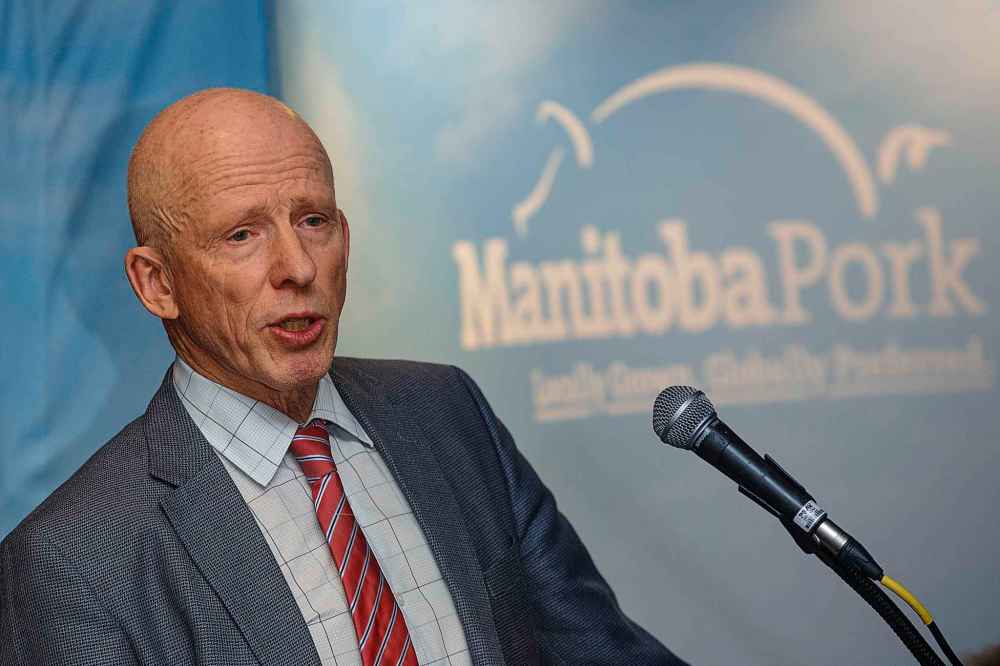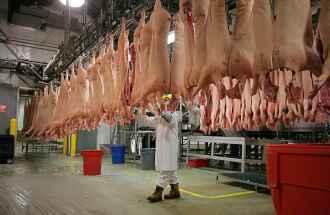Industry, advocates clash over work permit changes Migrant-rights activists claim current system sets up workers for exploitation; pork council says hogwash
Read this article for free:
or
Already have an account? Log in here »
To continue reading, please subscribe:
Monthly Digital Subscription
$0 for the first 4 weeks*
- Enjoy unlimited reading on winnipegfreepress.com
- Read the E-Edition, our digital replica newspaper
- Access News Break, our award-winning app
- Play interactive puzzles
*No charge for 4 weeks then price increases to the regular rate of $19.00 plus GST every four weeks. Offer available to new and qualified returning subscribers only. Cancel any time.
Monthly Digital Subscription
$4.75/week*
- Enjoy unlimited reading on winnipegfreepress.com
- Read the E-Edition, our digital replica newspaper
- Access News Break, our award-winning app
- Play interactive puzzles
*Billed as $19 plus GST every four weeks. Cancel any time.
To continue reading, please subscribe:
Add Free Press access to your Brandon Sun subscription for only an additional
$1 for the first 4 weeks*
*Your next subscription payment will increase by $1.00 and you will be charged $16.99 plus GST for four weeks. After four weeks, your payment will increase to $23.99 plus GST every four weeks.
Read unlimited articles for free today:
or
Already have an account? Log in here »
Hey there, time traveller!
This article was published 24/07/2019 (2329 days ago), so information in it may no longer be current.
Manitoba migrant-rights activists and the province’s pork lobby are clashing over a federal proposal to unlink seasonal workers’ permits from their employers.
“The moment you put parameters around your employment, your choices become that much diminished, and that’s where exploitation comes in,” said Diwa Marcelino, a member of Migrante Manitoba.
“As an organization, we received constantly — every single day, almost — cases of workers being abused, specifically because of their permit.”

A month ago, the Liberals put out a notice that they were considering changing the temporary foreign worker (TFW) program, to stop linking work permits to specific employers and instead issuing permits for particular occupations, regardless of workplace.
Under existing TFW rules, people can change jobs only if they apply for a new permit, which requires fees, paperwork and a new labour-market evaluation.
“The employer-specific work permit can create a power imbalance favouring the employer and conditions for potential worker abuse,” reads the federal notice, arguing the current system sets up employees for “abuse or exploitation.”
The Manitoba Pork Council suggested that’s hogwash, in a letter this month to the Trudeau government.
“The current program also has contingencies, such as a 1-800 telephone hotline, for workers to report any issues of vulnerability or abuse, at which time the government can intervene immediately to re-permit the worker to another employer, or help the worker return to their home country,” wrote MPC chair George Matheson.
“These situations seldom arise in the agriculture industry in Manitoba.”
The federal change would allow agriculture workers and low-wage staff under the TFW program to change jobs within the same type of work, though this would still require a labour-marker evaluation and possibly a period where workers are pegged to their employers.
Parliamentary committees recommended such a change in 2016 and 2009.
Yet the pork lobby said such a change would be unfair, especially with smaller employers paying upfront costs like insurance and travel to bring workers to Canada.
The changes “will render the program pointless for most employers and do nothing to resolve the shortfall” in agriculture, wrote Matheson, who added that the industry is dealing with enough issues like China’s restrictions on Canadian pork.
He warned “unscrupulous labour recruiters” could abuse TFW applicants, “by bringing them into Canada on a valid legal basis, then shuffling them out of sight and off the Government of Canada’s radar.”
Marcelino bristled at that claim, saying Migrante Manitoba is helping with “almost two dozen cases” of people who claim to be working unpaid, or wrongfully fired for things like getting sick or pregnant.
He said vulnerable TFW people don’t reach out to the existing government protections, and that even his own group started a toll-free number but shut it down, because few people call.
“There’s a chill factor; people self-censor themselves,” Marcelino said, arguing workers fear deportation and only reach out to friends.

“If the work has more options, they’ll be less likely to endure exploitation, harassment, unfair wages (and) unpaid overtime.”
He argued Ottawa should go beyond pegging employees to their industry and giving them landed-immigrant status, which would effectively end the idea of temporary workers.
In theory, the TFW program is meant to fill jobs that Canadian nationals aren’t taking, while not driving down Canadian wages or working conditions, though critics argue it does neither of those things.
Proposed changes for temporary foreign workers, with Manitoba Pork letter
Federal Labour Minister Patty Hajdu was unavailable for a Wednesday interview, but her spokesperson wrote that Canada’s low unemployment rate “has led to challenges for employers who struggle to fill vacancies and maintain growth and productivity.”
Véronique Simard wrote that the Liberals are eager to hear from stakeholder groups.
“The Manitoba Pork Council’s submission to the ongoing consultation will help us develop long term solutions that that seek to balance the needs of employers while protecting temporary foreign workers who help grow Canada’s economy.”
The federal Liberals have started reforming the TFW program in the twilight of their mandate. Last month, they launched a open work permit for “vulnerable workers” who are “experiencing abuse, or are at risk of abuse” at work.
Two weeks ago, the Liberals announced they’d launch a permanent-residency stream for some agricultural workers starting in 2020, for businesses like meat cutters and mushroom harvesters, both of which are in-demand in Manitoba.
dylan.robertson@freepress.mb.ca











